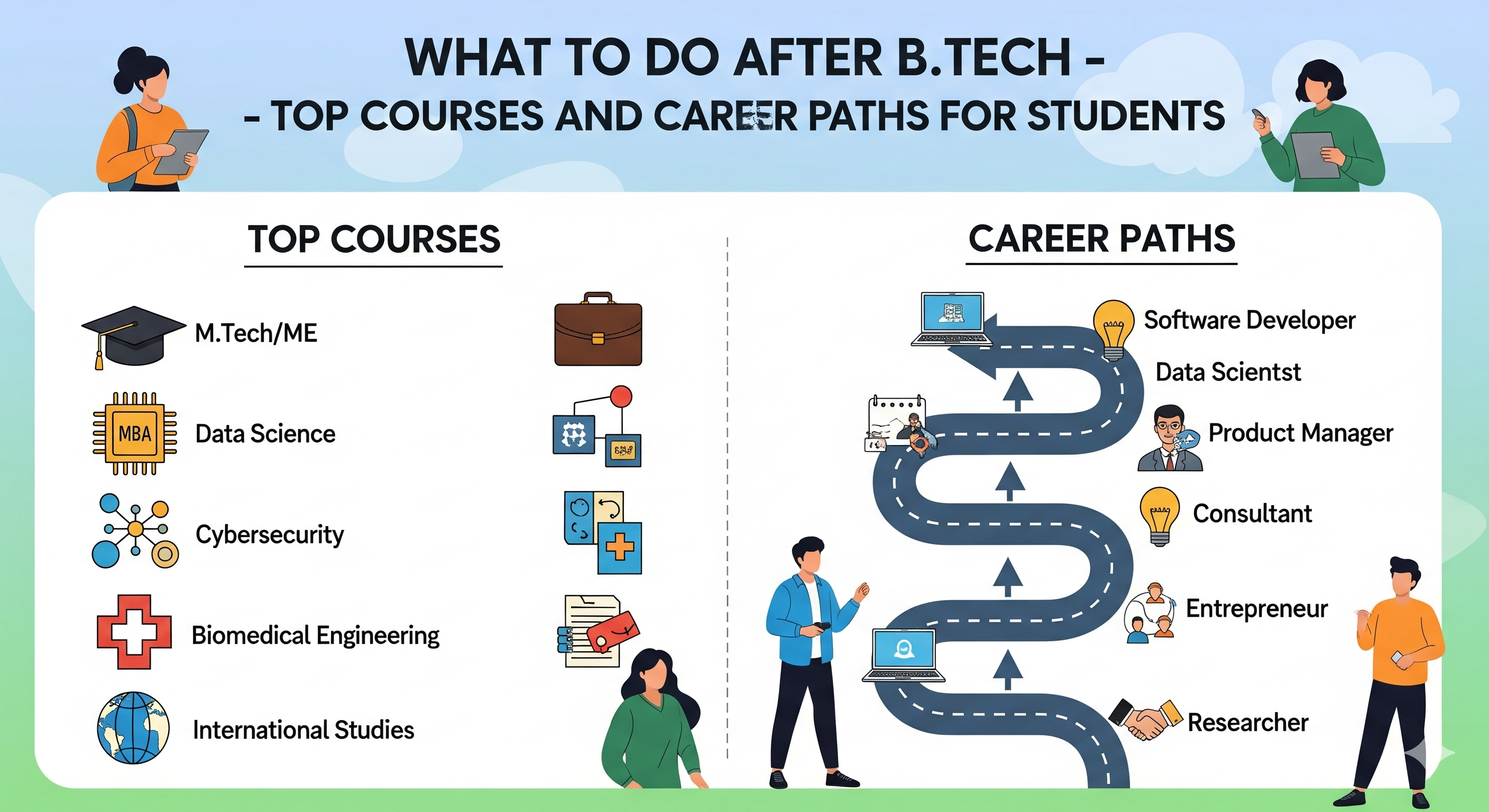
What to Do After B.Tech? Best Courses & Careers *
What to do post-BTech? Should you go for higher studies, high-income jobs or entrepreneurship? In this in-depth guide, we will cover your choices in terms of which courses after BTech to take, as well as which career paths after BTech are there to you, so that you have all the information you need to decide on your career. This article will clarify the common queries you might have, such as post-BTech options and what to do after BTech.
Higher Studies To Upgrade Your Skills
For most BTech graduates, going for higher studies is a smart move to specialise, gain technical expertise, and pave the way for research and leadership positions. Some of the most sought-after post-BTech courses for higher studies are as follows:
Master of Technology (M.Tech) / Master of Engineering (M.E.)
M.Tech or M.E. is a 2-year course which provides in-depth knowledge in various fields of engineering. It includes fields like computer science, electronics, and civil engineering. In today's age of innovation, specialisations that are increasingly in demand are:
- Artificial Intelligence
- Machine Learning
- Data Science
- Robotics
- Structural Engineering
Advanced Manufacturing/Industry 4.0
Admission for this is usually done by passing the GATE examination in India or the GRE/TOEFL abroad. Advantage lies in improved technical skills, increased value of salary, and experience in research. These are excellent courses after BTech for you to specialise in.
Master of Business Administration
MBA is a 2-year course which helps in understanding the management part of an association and fills the gap between technical education and management education. MBA is popular among BTech graduates who aim to reach managerial positions. The most popular courses after BTech that are pursued by the students are:
- Operations Management
- Finance
- Marketing
- Data Analytics
- IT Management
Admission examinations are CAT, GMAT, and XAT. An MBA opens various career opportunities like project manager, business analyst, or product manager with cross-functional exposure and higher salary opportunities.
Master of Science (M.Sc./MS) Abroad
MSc is a postgraduate degree which focuses on scientific, technological, engineering and mathematical fields. These courses after BTech offer excellent exposure and special learning, typically with research-based learning in the field of engineering or technology. Having an MSc/MS degree will give you global career opportunities after Btech and in varied academic fields.
Post Graduate Diploma (PGDM/PGP)
A postgraduate diploma in management is a 2-year course which is offered by autonomous institutes. It is another very good post-BTech option for management aspirants.
Well-Paying Job Opportunities Right After BTech
If you want to work right after completing your BTech studies, well-paying job opportunities are available based on your BTech specialisation. Here is the most common answer to “What to do after BTech?"
Core Engineering Professions
Your career choices rely on your branch of engineering:
Branch |
Example Roles |
|---|---|
| Computer Science/IT | Software Developer, Web Developer, DevOps Engineer, QA Engineer |
| Electronics & Communication | Embedded Systems Engineer, VLSI Design Engineer, Network Engineer |
| Mechanical | Design Engineer, Production Engineer, Automation Engineer |
| Civil | Site Engineer, Structural Engineer, Construction Manager |
| Electrical | Power Systems Engineer, Control Systems Engineer |
Today's trends include interdisciplinarity with, for example, adding AI or robotics to mechanical engineering, expanding your career horizons.
Non-Core & Emerging Technology Roles
Apply your engineering skills in high-tech emerging industries, representing high-growth post-BTech options like:
- Data Analyst
- Data Scientist
- AI and Machine Learning Engineer
- Cybersecurity Analyst
- Cloud Computing Specialist
- DevOps Engineer
- Business Intelligence Analyst
- Product Manager (combining tech and business)
These demand programming skills (Python, Java, R), an analytical mind, and domain expertise. These are some of the best fields for high growth to consider for your career after BTech.
Government Jobs
Various government jobs provide different perks, security, and good pay, other than the tech companies. Government jobs represent stable post-BTech options:
- You can get into Public Sector Undertakings (PSUs) such as BHEL and ONGC, and many more, through GATE.
- Indian Engineering Services (IES/ESE) are public sector jobs
- Going into civil services through UPSC.
- Defence Services (TGC, UES, AFCAT)
- If you have a keen interest in R&D, then join these Institutes (ISRO, DRDO, BARC)
- Railway Recruitment Board (RRB) & Staff Selection Commission (SSC JE)
- State Government Engineering Careers
These government sector jobs give a well-balanced life and have an important role in the development of society, providing a meaningful career after BTech.
Alternate Career Opportunities & Entrepreneurship
BTech graduates gain transferable skills that can be used for any alternate career opportunities or entrepreneurship options.
- Technical Writing: Suitable for communication-capable engineers.
- Content Creation & Blogging: Emphasis on the tech niche.
- Digital Marketing: SEO, SEM, and data-driven marketing.
- Consulting:Management or IT consulting profession.
- Education & Training: Instruction or teaching of technical disciplines.
- Actuarial Science: Best suited for students inclined towards mathematics.
Entrepreneurship
Entrepreneurship is a gamble but a bold move for BTech graduates, using problem-solving and technical abilities. Steps involve idea generation, market survey, planning, capital, and execution. Advantages are autonomy and innovation potential, although financial risk and overtime are issues. Although challenging, it might be one of the most rewarding answers to “What to do after BTech?”
Key Skills to Achieve Post-BTech
Success in any career after BTech requires a mix of technical and soft skills.
Technical Skills
- Programming Languages: C++, Java, Python, JavaScript
- Data Tools: Excel, SQL, Tableau, Power BI
- Cloud Platforms: Google Cloud, Azure, AWS
- Domain Software: CAE, CAD, and simulation software
- Cybersecurity Tools and Principles
Conclusion
A BTech degree comes with numerous advantages: further education (the above-mentioned courses after BTech), immediate job opportunities, public service, varied career options, and business ownership. Everything is available in plenty and is multidimensional. A blueprint is waiting to be devised based on your choices, goals, and circumstances. Incorporate lifelong learning and a willingness to learn in a permanently shifting employment environment.
A BTech degree should be followed by the courses mentioned above and professions for a fulfilling and socially significant career after BTech. With the help of this comprehensive article, which looks at various post-BTech options, you should get an answer to your question: What to do after BTech?
FAQs


